Abstract
A strong tradition exists in the psychiatric literature to consider postpartum depression a distinct diagnosis. However, the empirical evidence indicates that, in terms of etiology and relapse rates, postpartum depression is indistinguishable from non-postpartum depression. Symptomatically, postpartum depression seems to involve a milder disturbance, suggesting that it is best seen as an adjustment disorder. This paper summarizes the empirical evidence relevant to the distinct diagnosis question, and considers the benefits to be derived from challenging the traditional view of postpartum depression.
Full text
PDF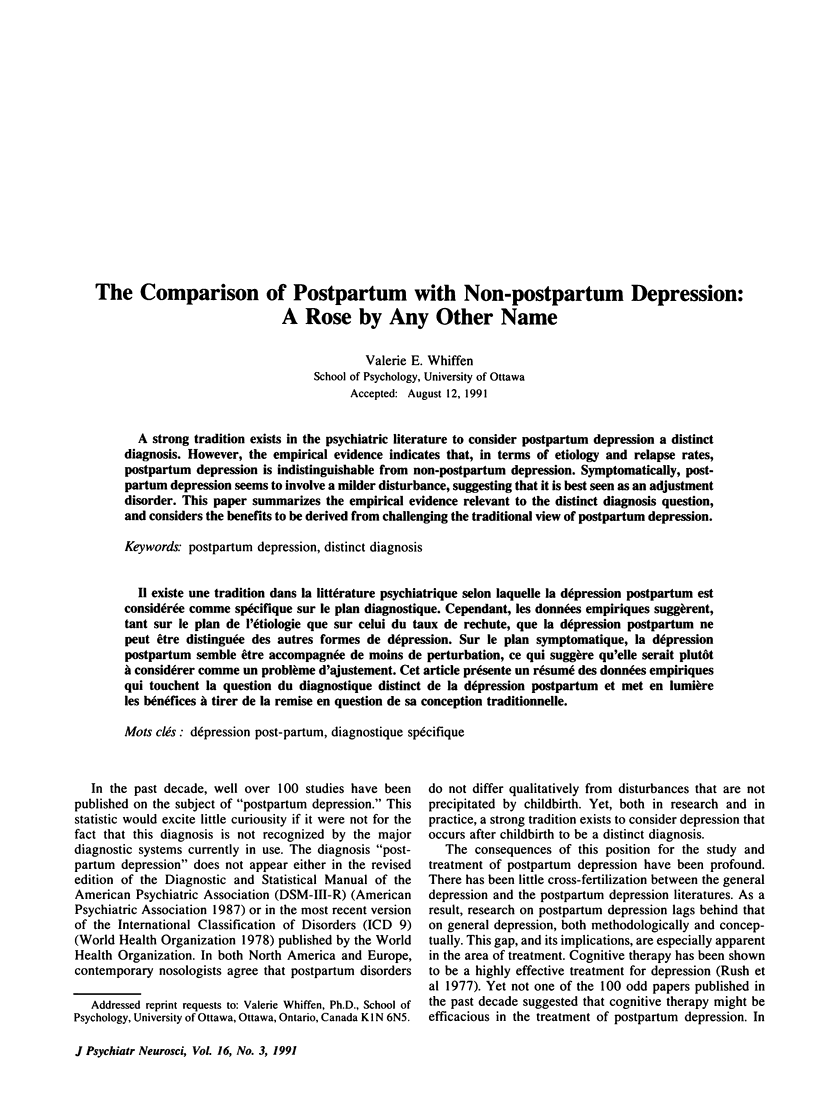
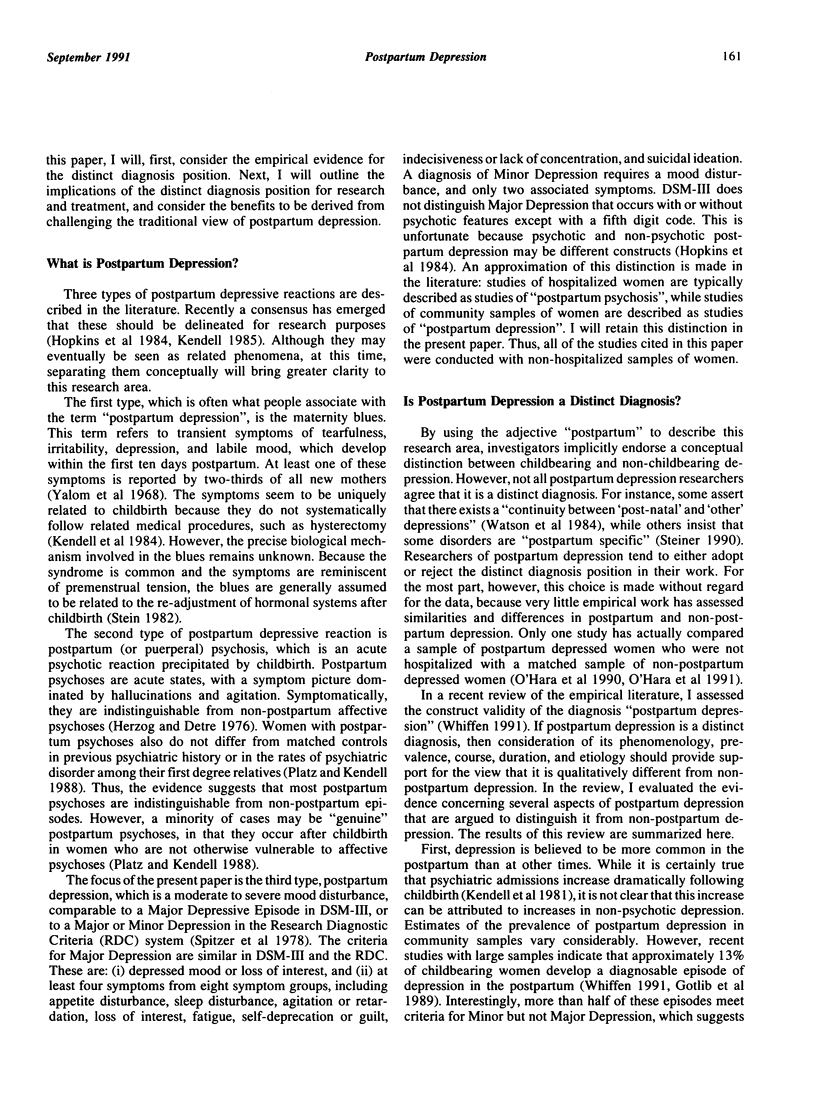
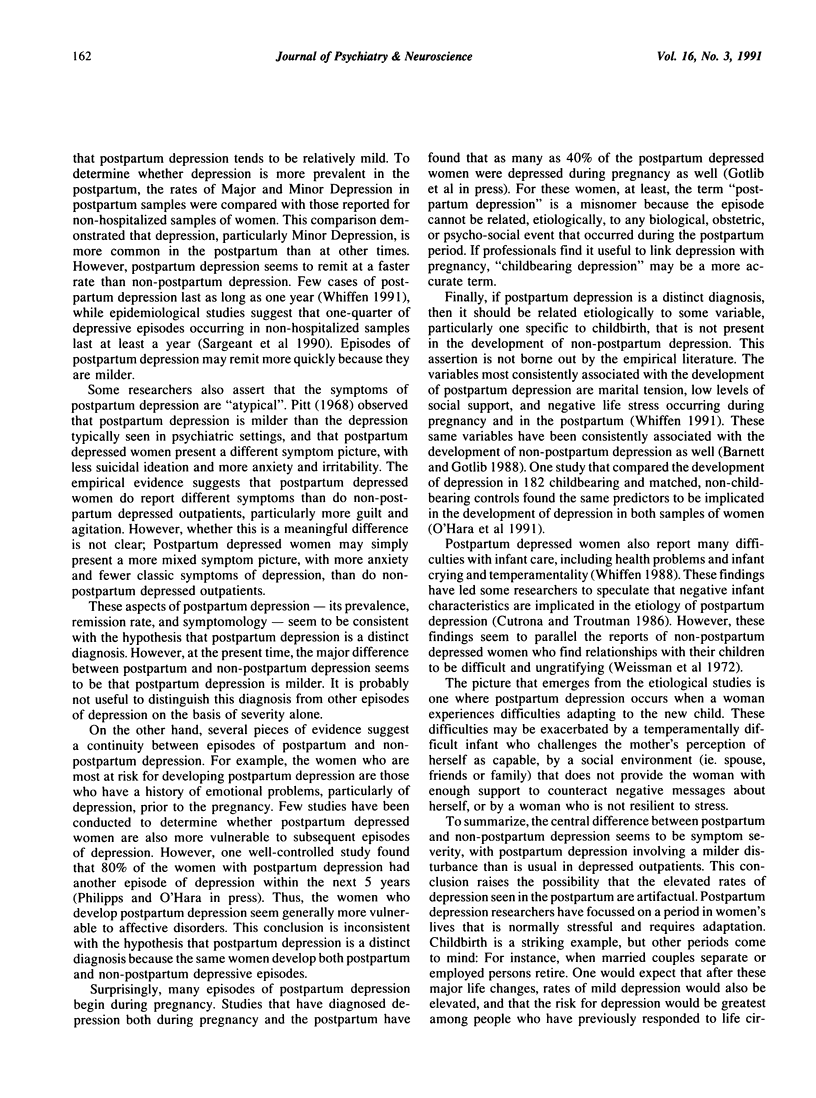
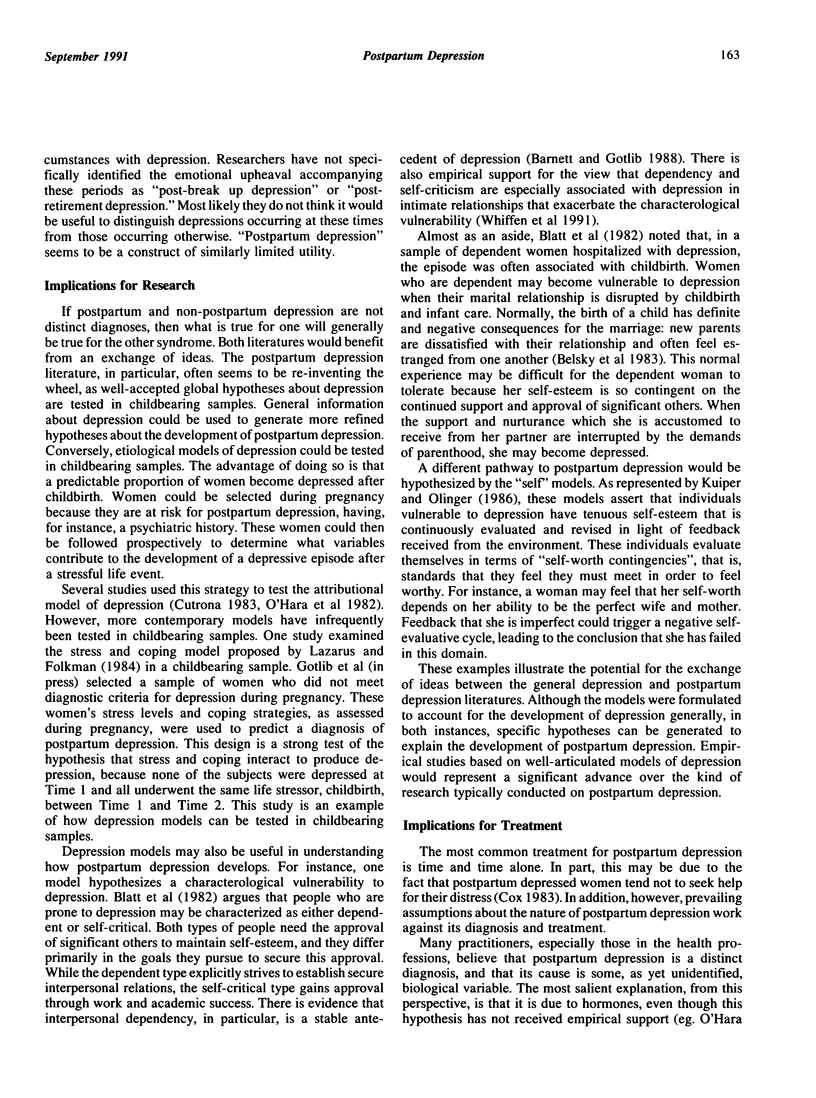
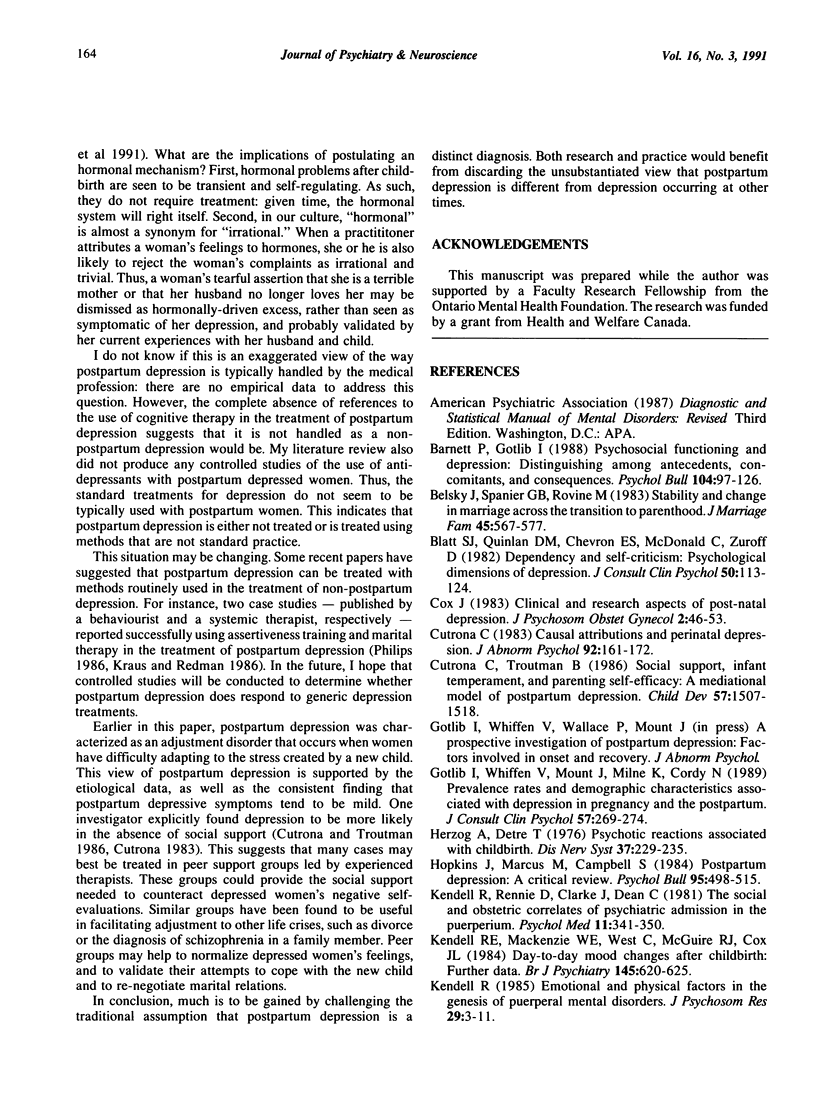
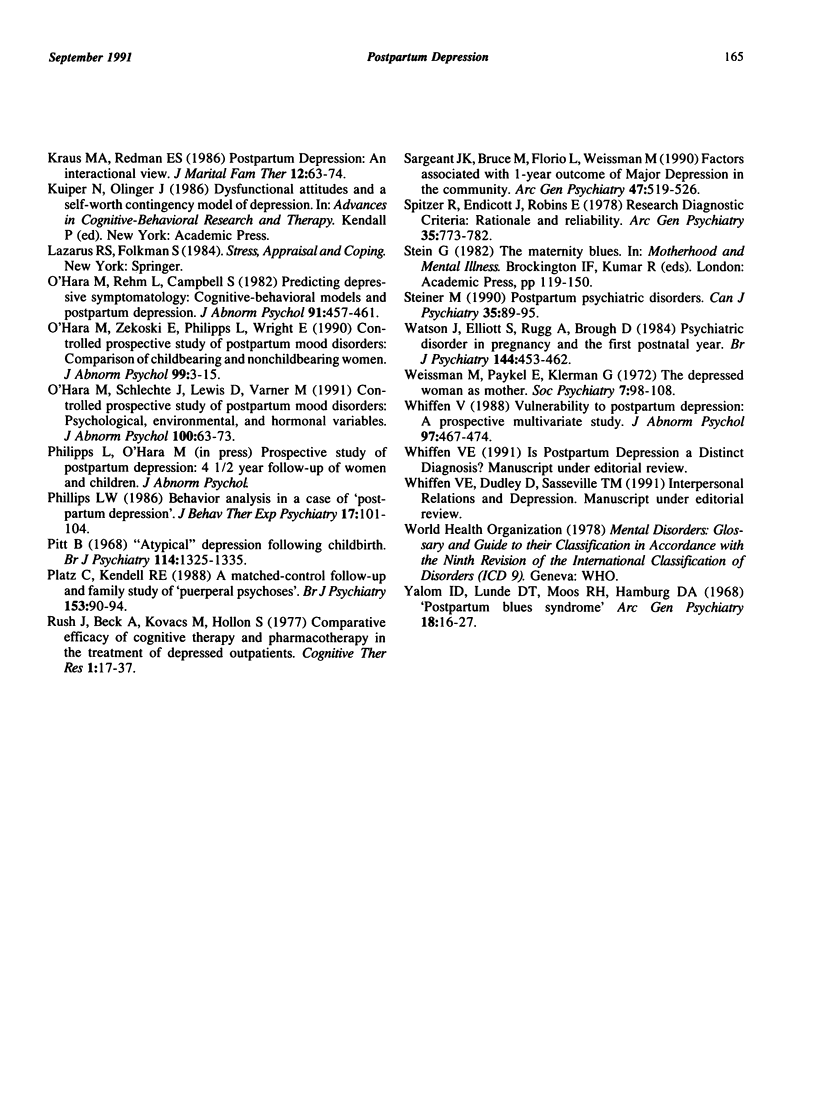
Selected References
These references are in PubMed. This may not be the complete list of references from this article.
- Barnett P. A., Gotlib I. H. Psychosocial functioning and depression: distinguishing among antecedents, concomitants, and consequences. Psychol Bull. 1988 Jul;104(1):97–126. doi: 10.1037/0033-2909.104.1.97. [DOI] [PubMed] [Google Scholar]
- Blatt S. J., Quinlan D. M., Chevron E. S., McDonald C., Zuroff D. Dependency and self-criticism: psychological dimensions of depression. J Consult Clin Psychol. 1982 Feb;50(1):113–124. doi: 10.1037//0022-006x.50.1.113. [DOI] [PubMed] [Google Scholar]
- Cutrona C. E. Causal attributions and perinatal depression. J Abnorm Psychol. 1983 May;92(2):161–172. doi: 10.1037//0021-843x.92.2.161. [DOI] [PubMed] [Google Scholar]
- Cutrona C. E., Troutman B. R. Social support, infant temperament, and parenting self-efficacy: a mediational model of postpartum depression. Child Dev. 1986 Dec;57(6):1507–1518. [PubMed] [Google Scholar]
- Gotlib I. H., Whiffen V. E., Mount J. H., Milne K., Cordy N. I. Prevalence rates and demographic characteristics associated with depression in pregnancy and the postpartum. J Consult Clin Psychol. 1989 Apr;57(2):269–274. doi: 10.1037//0022-006x.57.2.269. [DOI] [PubMed] [Google Scholar]
- Herzog A., Detre T. Psychotic reactions associated with childbirth. Dis Nerv Syst. 1976 Apr;37(4):229–235. [PubMed] [Google Scholar]
- Hopkins J., Marcus M., Campbell S. B. Postpartum depression: a critical review. Psychol Bull. 1984 May;95(3):498–515. [PubMed] [Google Scholar]
- Kendell R. E. Emotional and physical factors in the genesis of puerperal mental disorders. J Psychosom Res. 1985;29(1):3–11. doi: 10.1016/0022-3999(85)90003-0. [DOI] [PubMed] [Google Scholar]
- Kendell R. E., Mackenzie W. E., West C., McGuire R. J., Cox J. L. Day-to-day mood changes after childbirth: further data. Br J Psychiatry. 1984 Dec;145:620–625. doi: 10.1192/bjp.145.6.620. [DOI] [PubMed] [Google Scholar]
- Kendell R. E., Rennie D., Clarke J. A., Dean C. The social and obstetric correlates of psychiatric admission in the puerperium. Psychol Med. 1981 May;11(2):341–350. doi: 10.1017/s0033291700052156. [DOI] [PubMed] [Google Scholar]
- O'Hara M. W., Rehm L. P., Campbell S. B. Predicting depressive symptomatology: cognitive-behavioral models and postpartum depression. J Abnorm Psychol. 1982 Dec;91(6):457–461. doi: 10.1037//0021-843x.91.6.457. [DOI] [PubMed] [Google Scholar]
- O'Hara M. W., Schlechte J. A., Lewis D. A., Varner M. W. Controlled prospective study of postpartum mood disorders: psychological, environmental, and hormonal variables. J Abnorm Psychol. 1991 Feb;100(1):63–73. doi: 10.1037//0021-843x.100.1.63. [DOI] [PubMed] [Google Scholar]
- O'Hara M. W., Zekoski E. M., Philipps L. H., Wright E. J. Controlled prospective study of postpartum mood disorders: comparison of childbearing and nonchildbearing women. J Abnorm Psychol. 1990 Feb;99(1):3–15. doi: 10.1037//0021-843x.99.1.3. [DOI] [PubMed] [Google Scholar]
- Phillips L. W. Behavior analysis in a case of "post-partum depression". J Behav Ther Exp Psychiatry. 1986 Jun;17(2):101–104. doi: 10.1016/0005-7916(86)90045-5. [DOI] [PubMed] [Google Scholar]
- Pitt B. "Atypical" depression following childbirth. Br J Psychiatry. 1968 Nov;114(516):1325–1335. doi: 10.1192/bjp.114.516.1325. [DOI] [PubMed] [Google Scholar]
- Platz C., Kendell R. E. A matched-control follow-up and family study of 'puerperal psychoses'. Br J Psychiatry. 1988 Jul;153:90–94. doi: 10.1192/bjp.153.1.90. [DOI] [PubMed] [Google Scholar]
- Sargeant J. K., Bruce M. L., Florio L. P., Weissman M. M. Factors associated with 1-year outcome of major depression in the community. Arch Gen Psychiatry. 1990 Jun;47(6):519–526. doi: 10.1001/archpsyc.1990.01810180019004. [DOI] [PubMed] [Google Scholar]
- Spitzer R. L., Endicott J., Robins E. Research diagnostic criteria: rationale and reliability. Arch Gen Psychiatry. 1978 Jun;35(6):773–782. doi: 10.1001/archpsyc.1978.01770300115013. [DOI] [PubMed] [Google Scholar]
- Steiner M. Postpartum psychiatric disorders. Can J Psychiatry. 1990 Feb;35(1):89–95. doi: 10.1177/070674379003500117. [DOI] [PubMed] [Google Scholar]
- Watson J. P., Elliott S. A., Rugg A. J., Brough D. I. Psychiatric disorder in pregnancy and the first postnatal year. Br J Psychiatry. 1984 May;144:453–462. doi: 10.1192/bjp.144.5.453. [DOI] [PubMed] [Google Scholar]
- Whiffen V. E. Vulnerability of postpartum depression: a prospective multivariate study. J Abnorm Psychol. 1988 Nov;97(4):467–474. doi: 10.1037//0021-843x.97.4.467. [DOI] [PubMed] [Google Scholar]
- Yalom I. D., Lunde D. T., Moos R. H., Hamburg D. A. "Postpartum blues" syndrome. A description and related variables. Arch Gen Psychiatry. 1968 Jan;18(1):16–27. doi: 10.1001/archpsyc.1968.01740010018003. [DOI] [PubMed] [Google Scholar]


